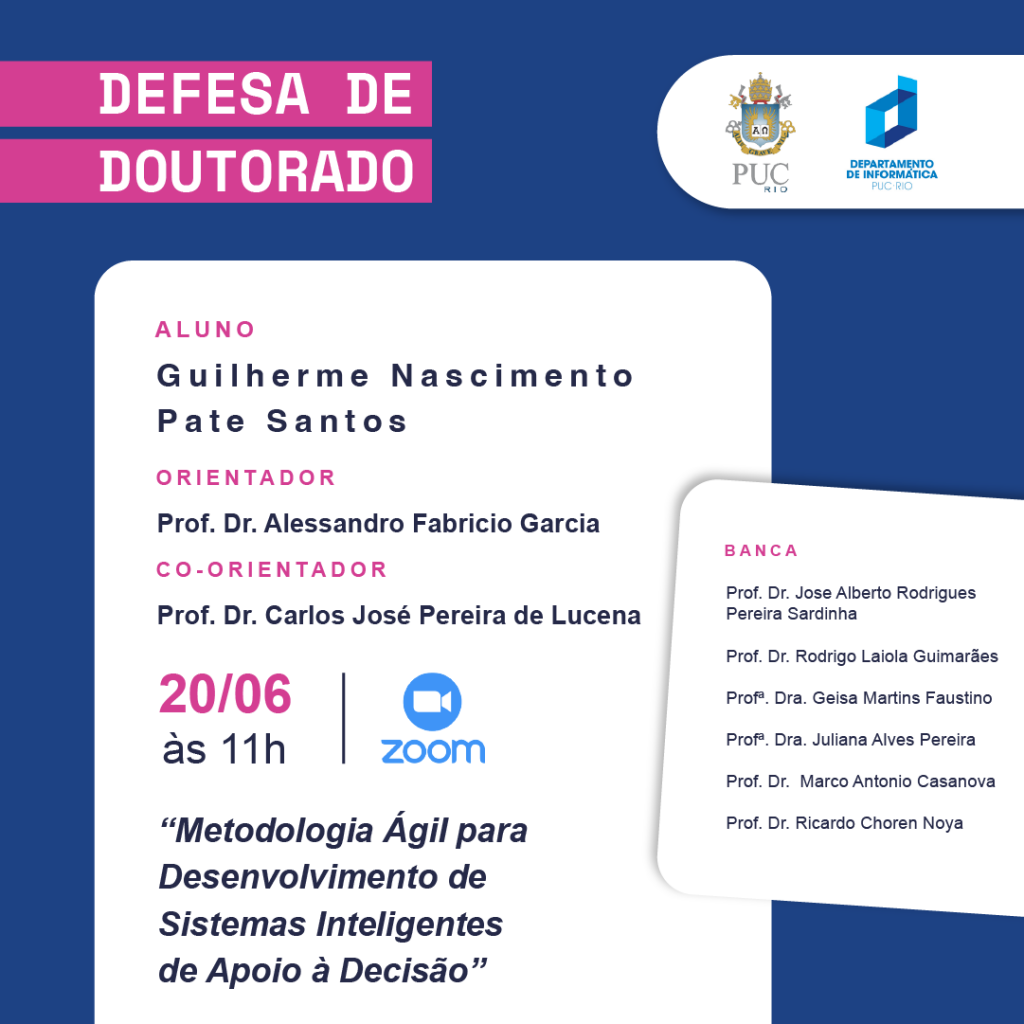 Defesa de Tese de Doutorado do aluno Guilherme Nascimento Pate Santos.
Defesa de Tese de Doutorado do aluno Guilherme Nascimento Pate Santos.
Título da tese: Metodologia Ágil para Desenvolvimento de Sistemas Inteligentes de Apoio à Decisão
Resumo: A metodologia proposta, MaSID, traz uma abordagem ágil para o desenvolvimento de sistemas inteligentes de apoio à decisão. Esta abordagem dispõe de um fluxo iterativo e incremental que engloba o gerenciamento do ciclo de vida através de fases. Cada fase é composta por três reuniões de trabalho, de 15 minutos cada, que recebem artefatos de entrada e geram artefatos de saída, resultado das análises realizadas. O método de condução das reuniões visa garantir maior eficiência, colaboração e adaptação às mudanças. Para análises mais profundas durante as reuniões, a metodologia disponibiliza frameworks conceituais, para utilização e extensão de funcionalidades. As reuniões da metodologia estão dispostas em cinco fases: iniciação, análise e planejamento, negociação, controle e suporte inteligente à decisão. Um ciclo representa uma passagem por todas as fases do método, já a execução de uma fase significa que todas as reuniões planejadas foram realizadas. Para cada uma das fases a metodologia disponibiliza artefatos específicos que visam apoiar e aprofundar as análises. Como exemplos podemos citar o gráfico 3D de complexidade que permite visualizar o tamanho e a complexidade do software desejado, além disso, artefatos no formato de quadro e formulários também são disponibilizados pela metodologia. O gráfico 3D e o artefato denominado, quadro de requisitos por camadas e pessoas chave apoiam nas definições e priorização dos pacotes. Os formulários com o uso de perguntas pré-estabelecidas se apresentam como um elemento acelerador da metodologia. Estes artefatos melhoram tanto o processo cognitivo quanto às análises de feedback, além de viabilizar um ambiente de colaboração para a reunião. Por fim, entendemos que a metodologia pode melhorar a qualidade e a objetividade das definições do critério de inteligência em um sistema de apoio à decisão.
Orientador: Prof. Dr. Alessandro Fabricio Garcia
Co-orientador: Prof. Dr. Carlos José Pereira de Lucena
Banca: Prof. Dr. Jose Alberto Rodrigues Pereira Sardinha | Prof. Dr. Rodrigo Laiola Guimarães | Profª. Drª. Geisa Martins Faustino | Profª. Drª. Juliana Alves Pereira | Prof. Dr. Marco Antonio Casanova | Prof. Dr. Ricardo Choren Noya
Assista a defesa pelo link: https://puc-rio.zoom.us/j/99623329466?pwd=vEdRY32OEKbZqspf5IjEye1QdPETjU.1
#dissertação #mestrado #pesquisa #desenvolvimento #alunos #dipucrio
Autor: Guilherme Nascimento Pate Santos
Orientador: Alessandro Fabricio Garcia / Carlos José Pereira de Lucena
Data e Hora: 20/06/2024 às 11:00
Local: Videoconferência
Autor: Hugo Fabiano Alves Cunha
Orientador: Marcelo Gattass
Data e Hora: 12/06/2024 às 10:00
Local: Videoconferência
Autor: Eduardo Zimelewicz
Orientador: Marcos Kalinowski
Data e Hora: 14/06/2024 às 10:00
Local: Videoconferência
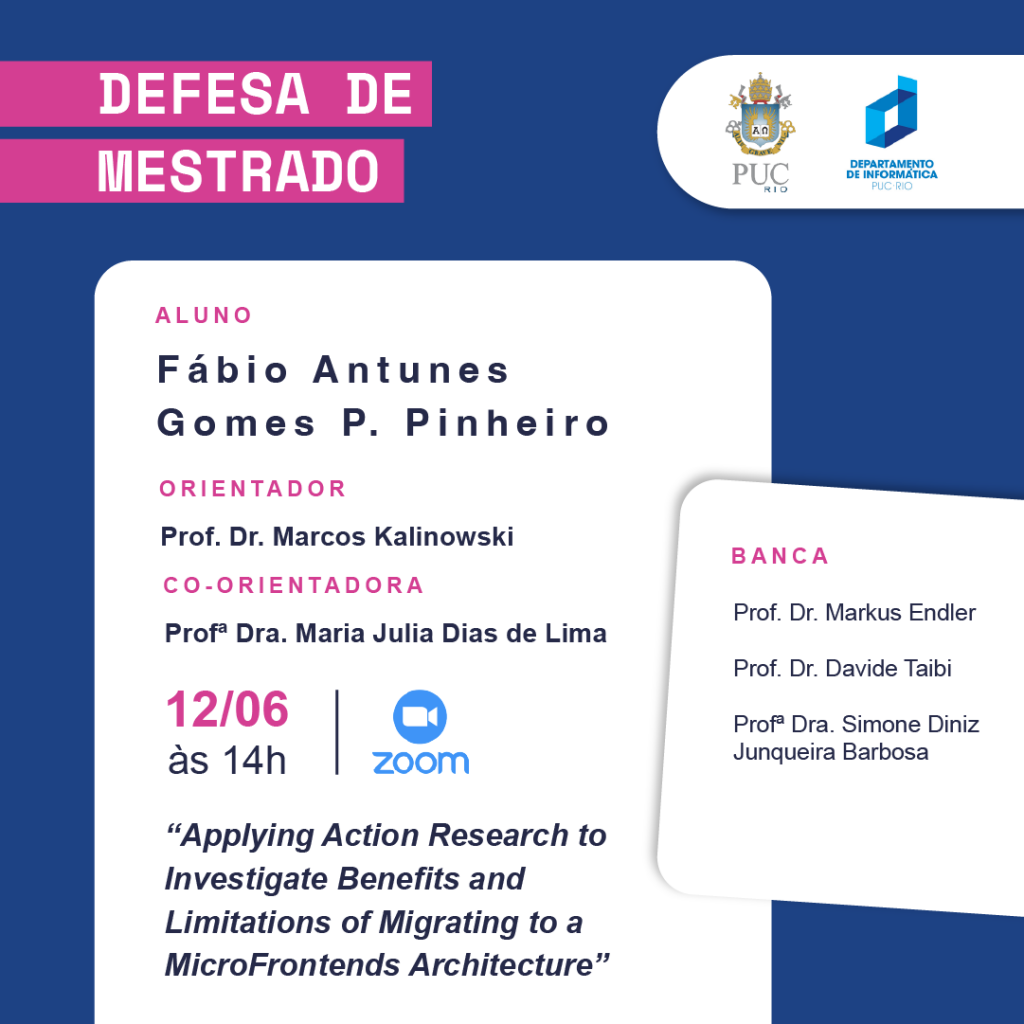 Defesa de Dissertação de Mestrado do aluno Fábio Antunes Gomes P. Pinheiro.
Defesa de Dissertação de Mestrado do aluno Fábio Antunes Gomes P. Pinheiro.
Título da dissertação: Applying Action Research to Investigate Benefits and Limitations of Migrating to a MicroFrontends Architecture
Resumo: [Context] The adoption of micro-frontends architectures has gained traction as a promising approach to enhance modularity, scalability,and maintainability of web applications.[Goal] The primary aim of this research is to investigate the benefits and limitations of migrating a real-world application to a micro frontend architecture from the perspective of the developers.[Method] Employing action research, after the diagnosis and planning,we applied an intervention of migrating the target web application toa micro-frontends architecture. Thereafter, the migration was evaluated in a workshop involving the developers responsible for maintaining the application. During the workshop, the developers were presented with the migrated architecture, conducted a simple maintenance task, discussed benefits and limitations in a focus group to gather insights, and answered a questionnaire on the acceptance of the technology.[Results] Developers’ perceptions gathered during the focus group reinforce the benefits and limitations reported in the literature. Key Benefits included enhanced flexibility in technology choices,scalability of development teams, and gradual migration of technologies. However, the increased complexity of the architecture raised concerns among developers, particularly in dependency and environment management, debugging, and integration testing.[Conclusions] While micro frontends represent a promising technology, unresolved issues currently still limit their broader applicability. Developers generally perceived the architecture as useful and moderately easy to use but exhibited hesitancy towards adopting it.
Orientador: Prof. Dr. Marcos Kalinowski
Co-orientadora: Profª Dra. Maria Julia Dias de Lima
Banca: Prof. Dr. Markus Endler | Prof. Dr. Davide Taibi | Profª Dra. Simone Diniz Junqueira Barbosa
Assista a defesa pelo link: https://puc-rio.zoom.us/j/4666190940?pwd=eUdNaDNSbnhEY3VWWU1DMGF0SkRjZz09
Autor: Fábio Antunes Gomes Pitta Pinheiro
Orientador: Marcos Kalinowski
Data e Hora: 12/06/2024 às 09:00
Local: Videoconferência
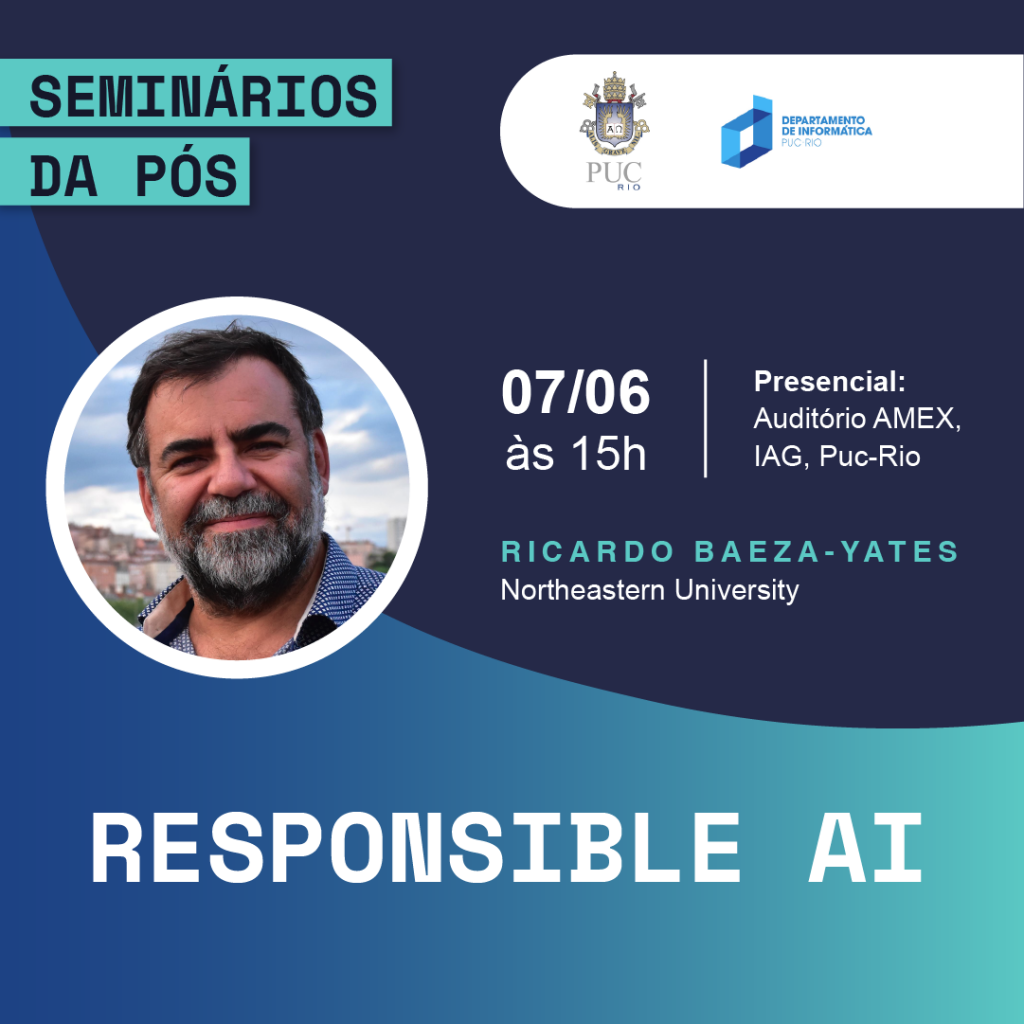 Dia 07/06, às 15h, acontecerá o seminário “Responsible AI”, proferido pelo professor Ricardo Baeza.
Dia 07/06, às 15h, acontecerá o seminário “Responsible AI”, proferido pelo professor Ricardo Baeza.
Seminário da Pós: “Responsible AI”
Resumo do Seminário: In the first part, to set the stage, we cover irresponsible AI: (1) discrimination (e.g., facial recognition, justice); (2) phrenology (e.g., biometric based predictions); (3) limitations (e.g., human incompetence, minimal adversarial AI), (4) indiscriminate use of computing resources (e.g., large language models) and (5) the impact of generative AI (disinformation, mental health and copyright issues). These examples do have a personal bias but set the context for the second part where we address three challenges: (1) principles & governance, (2) regulation and (3) our cognitive biases. We finish discussing our responsible AI initiatives and the near future.
Conheça o Professor: Ricardo Baeza-Yates is Director of Research at the Institute for Experiential AI of Northeastern University. Before, he was VP of Research at Yahoo Labs, based in Barcelona, Spain, and later in Sunnyvale, California, from 2006 to 2016. He is co-author of the best-seller Modern Information Retrieval textbook published by Addison-Wesley in 1999 and 2011 (2nd ed), that won the ASIST 2012 Book of the Year award. From 2002 to 2004 he was elected to the Board of Governors of the IEEE Computer Society and between 2012 and 2016 was elected for the ACM Council. In 2009 he was named ACM Fellow and in 2011 IEEE Fellow, among other awards and distinctions. He obtained a Ph.D. in CS from the University of Waterloo, Canada, in 1989, and his areas of expertise are web search and data mining, information retrieval, bias on AI, data science and algorithms in general.
O seminário será presencial, no Auditório AMEX, IAG, PUC-Rio
Você pode assistir online pelo link: https://youtube.com/live/Z5alWcVWhPo
Não perca!
 Dia 07, às 15h, acontecerá o seminário “Responsible AI”, proferido pelo professor Ricardo Baeza.
Dia 07, às 15h, acontecerá o seminário “Responsible AI”, proferido pelo professor Ricardo Baeza.
Seminário da Pós: “Responsible AI”
Resumo do Seminário: In the first part, to set the stage, we cover irresponsible AI: (1) discrimination (e.g., facial recognition, justice); (2) phrenology (e.g., biometric based predictions); (3) limitations (e.g., human incompetence, minimal adversarial AI), (4) indiscriminate use of computing resources (e.g., large language models) and (5) the impact of generative AI (disinformation, mental health and copyright issues). These examples do have a personal bias but set the context for the second part where we address three challenges: (1) principles & governance, (2) regulation and (3) our cognitive biases. We finish discussing our responsible AI initiatives and the near future.
Conheça o Professor: Ricardo Baeza-Yates is Director of Research at the Institute for Experiential AI of Northeastern University. Before, he was VP of Research at Yahoo Labs, based in Barcelona, Spain, and later in Sunnyvale, California, from 2006 to 2016. He is co-author of the best-seller Modern Information Retrieval textbook published by Addison-Wesley in 1999 and 2011 (2nd ed), that won the ASIST 2012 Book of the Year award. From 2002 to 2004 he was elected to the Board of Governors of the IEEE Computer Society and between 2012 and 2016 was elected for the ACM Council. In 2009 he was named ACM Fellow and in 2011 IEEE Fellow, among other awards and distinctions. He obtained a Ph.D. in CS from the University of Waterloo, Canada, in 1989, and his areas of expertise are web search and data mining, information retrieval, bias on AI, data science and algorithms in general.
O seminário será presencial, no Auditório AMEX, IAG, PUC-Rio
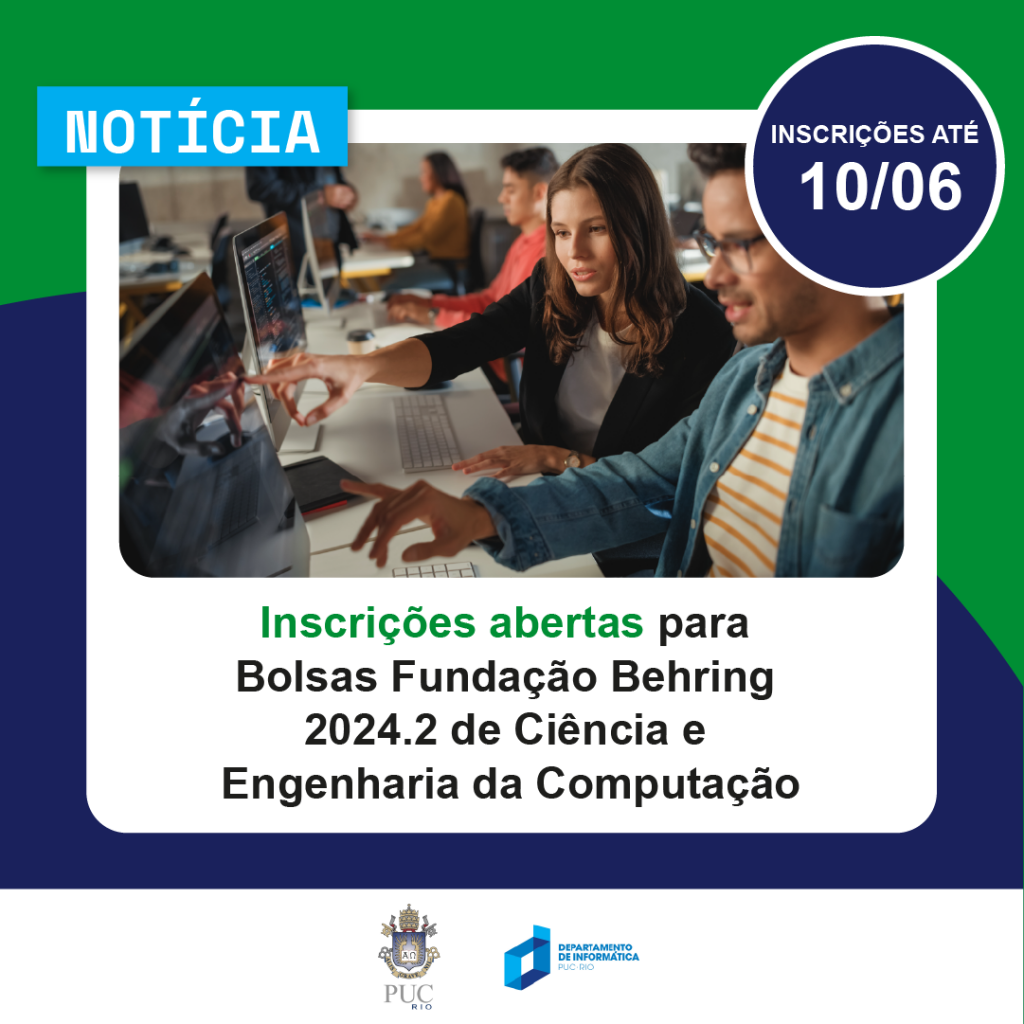 A Fundação Behring está disponibilizando 6 novas bolsas para Ciência e Engenharia da Computação para estudantes que irão ingressar em 2024.2.
A Fundação Behring está disponibilizando 6 novas bolsas para Ciência e Engenharia da Computação para estudantes que irão ingressar em 2024.2.
Para concorrer à Bolsa, a pessoa candidata deve:
– Estar inscrita no Processo Seletivo de Inverno – 2024 da PUC-Rio para o Grupo I e ter escolhido o curso Ciência da Computação ou o curso Engenharia da Computação;
– Preencher o formulário de inscrição da Bolsa Fundação Behring disponibilizado no site do Vestibular PUCRio 2024, informando todos os dados solicitados;
– Ser aprovada no Vestibular PUC-Rio 2024.2.
O prazo para se inscrever é até o dia 10/06
Não perca essa oportunidade!
Para saber mais informações e onde se inscrever, acesse o link: https://www.puc-rio.br/vestibular/202407/bolsas_behring.html
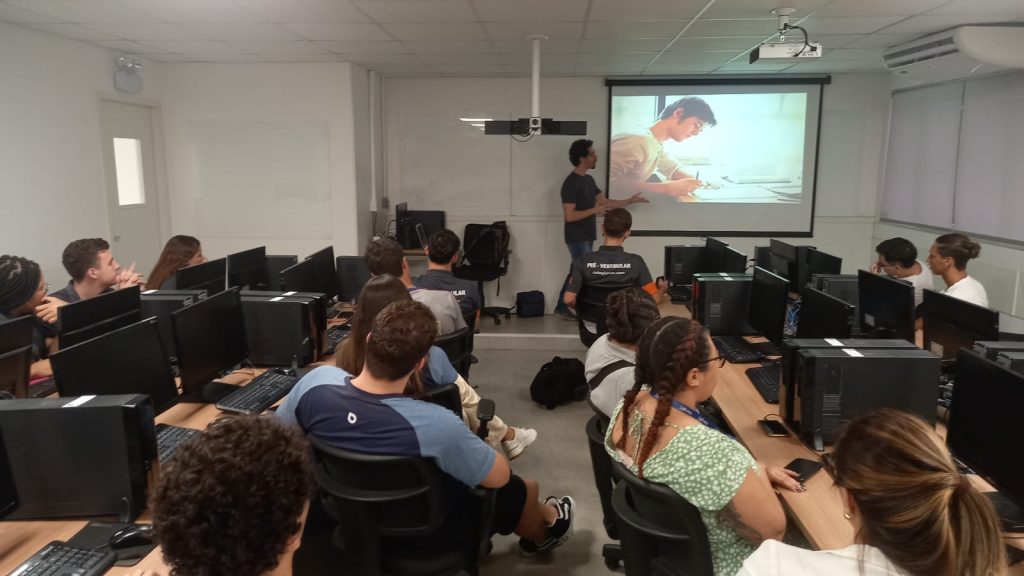 Nesta última sexta feira (24/05), o professor Luis Fernando Bicalho realizou duas palestra durante o evento ‘Puc por um dia’ quando apresentou os cursos de Ciências e Engenharia da Computação para alunos de ensino médio.
Nesta última sexta feira (24/05), o professor Luis Fernando Bicalho realizou duas palestra durante o evento ‘Puc por um dia’ quando apresentou os cursos de Ciências e Engenharia da Computação para alunos de ensino médio.
Ele também contou um pouco da sua trajetória enquanto aluno e sua participação no laboratório ICAD/Visionlab desenvolvendo jogos eletrônicos (games) para computador e celulares.

